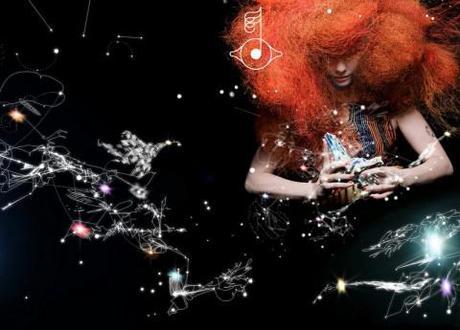
The cover for Bjork's new album, Biophilia. Photo Credit: zaylin14
Björk is at it again. The Icelandic singer, who cemented her fame with weird and wonderful melodies and equally original lyrics, released her new album Biophilia yesterday in a new and compelling way — as a series of ten iPad apps housed within a “mother app.” The album was even partially conceived on a tablet device; in an interview with midemblog the artist gave her opinion on tablet computers: “I feel touchscreens are simply tools, they are an extension of us. Different people prefer different tools; and of course it is not about the tool but what you do with it.”
The songs on the album (which is also available as a CD, with a 48 page bound book that contains essays by Dr. Nicola Dibbenden, a university of Sheffield senior lecturer, and, in another version, in an oak case with ten chrome-plated tuning forks) have a direct link to the apps, which have been developed in conjunction with a diverse collection of engineers, scientists, writers and artists (including Sir David Attenborough, whose voice has been sampled on the album). The focus of the songs is on scientific and natural themes that are reflected in the music and sounds used by Björk (“Moon” has musical cycles which echo lunar cycles and “Thunderbolt” is rife with arpeggios and the baseline is the sound of an electrical discharge leaving a tesla coil).
Björgvin Tómasson, who created two instruments for the album (a MIDI-controlled organ and an old celeste converted to sound like a gamelan), said in The Guardian that the experience of working with Bjork was a novel one. ”Prior to this experience, I would never have thought of the possibility of doing anything like this to a 100-year-old instrument”, Tómasson said. “A new instrument was created in that moment.”
An eccentric yet exciting project. Helen Brown gave the album five stars in The Daily Telegraph and named it the album of the week. She noted that the album is a gambit, but one that has paid off. The end product is “surprisingly accessible”, invigorated by “the poetry” of science and its range — Brown praised the vacillation from “twinkling, chinking prettiness” to “frantic drum’n’bass” in the space of one song. She acknowledged that the album is “ willfully weird” but that it can prompt “a marvellous connection to all kinds of universal forces.”
Ignore the bumpf, it’s the music that’s great. Alex Petridis in The Guardian said that “once you’ve read the essays, there’s virtually no room for the listener to put their own interpretation on the songs, which at a stroke cancels out a portion of the pleasure of listening.” He did praise the music of the album, however, as “restless and innovative”, full of ”moments of pure, indulgent pleasure.”
Multi-media overreach. “A classic case of multi-media overreach” sniped Andy Gill in The Independent. Björk is “barely singing at all”, he said, “just vocally negotiating a series of uneasy rapprochements between words and music.” Gill found the range of musical parts (especially the injection of dubstep and drum’n’bass) scattered and unrelated to each other, though did appreciate the “wonderful choral arrangements.”

